Advances and Challenges in Bio-Based Lubricants for Sustainable Tribological Applications: A Comprehensive Review of Trends, Additives, and Performance Evaluation
Abstract
1. Introduction
2. Feedstock Challenges and Oleochemical Modifications of Bio-Based Lubricants
2.1. Chemical and Enzymatic Modification Pathways
2.2. Feedstock Diversification and Novel Sources, Including Green Greases
2.3. Structure–Property Relationships and Nano-Additive Incorporation
2.4. Summary of Feedstock and Modification Challenges
3. Tribological Properties of Bio-Based Lubricants
3.1. Friction and Wear Characteristics
3.2. Influence of Viscosity and Temperature
3.3. Additive Synergy (Nanoparticles & Ionic Liquids)
3.4. Application-Focused Evidence
3.5. Summary
4. Chemical Modifications and Additive Technologies for Bio-Based Lubricants
4.1. Chemical Modification Strategies
4.1.1. Transesterification and Esterification
- Transesterification typically involves the reaction of triglycerides with alcohols (e.g., methanol, polyols like trimethylolpropane) in the presence of acid, base, or enzymatic catalysts [8]. This process yields base stocks with better low-temperature flow and improved lubricity compared to unmodified oils by breaking down large triglyceride molecules into smaller, more uniform esters [20,21]. Polyol esters, such as TMP esters derived from rapeseed oil, have demonstrated excellent oxidative stability and superior film-forming capabilities, making them suitable for aviation turbine oils due to their high flash points and low volatility [8]. This method is widely applied both at laboratory scales and in industrial production due to its relative simplicity and effectiveness.
- Esterification of fatty acids with various alcohols produces synthetic esters with high viscosity indices, low volatility, and improved biodegradability [6]. These reactions yield base stocks with better low-temperature flow compared to unmodified oils, while preserving lubricity. This is also a well-established industrial practice.
4.1.2. Epoxidation and Ring-Opening Reactions
- Epoxidized soybean oil, for instance, demonstrates improved oxidative stability and high-temperature resistance, making it an attractive bio-lubricant component [19].
- However, epoxides may suffer from low-temperature crystallization. To address this, subsequent ring-opening reactions with organic acids produce estolides. These estolides exhibit superior cold-flow properties, enhanced anti-wear characteristics, and film strength, offering a balanced performance profile [8].
- Epoxidation-derived lubricants are widely studied as eco-friendly alternatives in applications requiring resistance to thermo-oxidative degradation. Recent studies in Lubricants report that epoxidized palm oil estolides blended with ZnO nanoparticles achieved synergistic anti-wear performance comparable to polyalphaolefins [10]. Epoxidation is a well-established laboratory method with significant industrial relevance, particularly in the production of plasticizers and stabilizers, and its application in lubricants is progressing towards industrial scale.
4.1.3. Hydrogenation and Hydroisomerization
- Hydrogenation reduces unsaturation by converting carbon-carbon double bonds into saturated carbon-carbon single bonds, thereby suppressing oxidative instability [9]. Hydrogenated oils possess enhanced thermal and oxidative resistance but often at the expense of pour point, as increased saturation tends to promote crystallization at low temperatures. This method is used both in lab research and for industrial applications, particularly for food oils.
- Hydroisomerization is used to overcome the low-temperature drawbacks of hydrogenation by altering the carbon skeleton, improving cold-flow behavior while maintaining oxidative stability [9].
- Catalytic hydrogenation combined with selective isomerization yields high-performance synthetic base oils with balanced viscosity-temperature properties. These advanced processes are typically subjects of ongoing research and specialized industrial applications.
4.1.4. Acylation, Grafting, and Advanced Functionalization
- Acylation of hydroxylated fatty esters with anhydrides can improve boundary lubrication properties.
- Graft copolymerization with monomers like acrylates or maleic anhydride can enhance dispersancy, oxidative resistance, and viscosity index.
- Enzymatic catalysis represents a particularly selective and environmentally benign route for modifications, allowing for the development of tailor-made lubricants under mild reaction conditions [6]. Recent reviews emphasize enzymatic modification as a promising route toward green chemistry in lubricant design, reducing reliance on high-energy chemical routes [19]. While highly promising, these advanced functionalization techniques are often in the lab-scale or early industrial adoption phases.
4.1.5. Industrial and Practical Implications of Chemical Modifications
4.2. Additive Technologies
4.2.1. Antioxidants
4.2.2. Pour Point Depressants
4.2.3. Viscosity Index Improvers
4.2.4. Nanoparticles as Additives
- Rolling/Ball-Bearing Effect: Nanoparticles can act as tiny ball bearings, converting sliding friction into rolling friction, thereby reducing energy losses [40].
- Mending Effect: They can fill microscopic depressions and scratches on contacting surfaces, smoothing them out and reducing stress concentrations [40].
- Protective Film Formation: Nanoparticles can deposit on friction surfaces to form a tenacious protective tribofilm, preventing direct metal-to-metal contact and minimizing wear [40].
4.2.5. Ionic Liquids
4.2.6. Hybrid Additive Systems
4.2.7. Additives for Green Greases
- Polyurea-based thickeners, for example, significantly affect the rheological and tribological properties of lubricating greases, including their flow limit and extreme pressure performance, depending on their degree of polymerization [32]. Studies have investigated the influence of thickener type, such as polyurea, on the rheological and tribological behavior of greases, highlighting its impact on consistency and overall performance in applications like ball bearings [33].
- The effect of base oil and thickener type, and their interactions, are critical for understanding the texture and flow of lubricating greases [36]. The base grease type has a significant role in the lubrication performance of additives like hexagonal boron nitride nanoparticles [37]. The friction coefficient of greases can be influenced by the type of solid lubricants incorporated, affecting the wear of rolling-sliding interfaces [38].
4.2.8. Comparative Assessment of Additive Categories
4.3. Summary
5. Industrial Adoption and Market Perspectives
5.1. Global Market Trends
5.2. Industrial Sectors of Adoption
- Marine Industry: This sector has seen widespread adoption of bio-based lubricants, particularly for stern tube oils and hydraulic fluids, driven by stringent mandates for environmentally acceptable lubricants under frameworks like the IMO and US EPA Vessel General Permit [54].
- Agriculture and Forestry: Due to the high risk of soil and water contamination from oil spillage, bio-based lubricants are increasingly used in chainsaw oils and tractor hydraulics [55]. Studies consider the possibility of using vegetable oils as working fluids for hydraulic systems of agricultural machinery, with specific lubrication formulas based on rapeseed oil being investigated.
- Construction and Mining: Efforts are being made to increase the use of bio-lubricants in mobile machinery within these sectors due to growing environmental and economic arguments for higher energy efficiency and lower emissions in off-road hydraulics.
- Automotive: Despite advantages like good lubricity and high viscosity index, widespread usage of bio-based lubricants in automotive applications is still limited by challenges concerning their performance, especially substandard oxidative stability and low temperature characteristics [56]. However, the development of synthetic esters offers promising applications, showcasing low volatility and high thermal stability, along with good lubricity [8]. Research has also explored the use of biodegradable lubricants for heavy duty engines and passenger cars.
- Aerospace: While specific industrial adoption remains limited, there is significant interest and research in seed-oil-derived lubricants for high-performance applications, aiming to address low-temperature performance and thermooxidative stability [57]. Ester-based lubricants are particularly investigated for their ability to improve the lubricity of aviation fuels.
5.3. Drivers of Adoption
- Environmental and Health Regulations: Global and regional policies, such as bans on non-biodegradable fluids and stricter discharge limits, are major drivers [58]. Legislation is becoming ever more restrictive with regard to the contents, use, and disposal of lubricants [58]. New regulations aim to minimize health and water hazards.
- Corporate Sustainability Goals: A growing number of Original Equipment Manufacturers and fleet operators are integrating bio-lubricants into their Environmental, Social, and Governance reporting and sustainability initiatives.
- Technological Advances: Significant improvements in bio-lubricant formulations, including enhanced oxidative stability, improved cold-flow properties, and the development of high-performance additives have reduced the performance gap with conventional lubricants.
5.4. Barriers to Market Expansion
- Cost: Bio-lubricants generally have higher production costs compared to mineral oil-based lubricants [63]. Academic sources confirm that the higher cost, primarily due to raw material expenses and smaller production volumes, remains a significant challenge for bulk applications [12,15]. For bio-lubricants, raw materials can account for a substantial portion (e.g., 70–80%) of the total cost [12]. Mineral oils, while offering adequate performance, are often favored due to their economic efficiency [64].
- Supply Chain Instability: Fluctuations in feedstock availability and pricing, especially for agricultural commodities, can directly impact the cost and reliability of bio-lubricant supply chains [52]. Performance Misconceptions: A prevalent misconception among end-users that bio-lubricants are “green but inferior” persists, despite modern formulations demonstrating comparable or superior tribological performance to synthetic oils in many tests [63].
5.5. Case Studies and Adoption Success
- Railway Industry: The sustained use of greases manufactured by Fuchs Lubritech GmbH on railways in Austria, Switzerland, Germany, and other countries confirms the effectiveness of their utilization in wheel-rail friction pairs, indicating successful implementation in railway infrastructure. This demonstrates successful industrial application of bio-lubricants in demanding railway environments.
5.6. Market Outlook
6. Sustainability and Environmental Performance of Bio-Based Lubricants
6.1. Biodegradability and Eco-Toxicity
6.2. Energy Efficiency and Friction Reduction
6.3. Life-Cycle Assessment and Carbon Footprint
Methodological Uncertainties in LCA
- System Boundaries: Defining the scope of an LCA (i.e., its “system boundaries”) profoundly impacts the outcome [73,74]. For lubricants, this involves deciding which stages of the product’s life cycle to include, such as “cradle-to-gate” (from raw material extraction to the factory gate) or “cradle-to-grave” (extending to the use phase and end-of-life treatment) [75]. The exclusion or inclusion of specific upstream processes (e.g., land-use change associated with agricultural feedstock production, which can have significant negative environmental consequences) or downstream processes (e.g., environmental impacts of lubricant disposal or biodegradation in nature) can shift the perceived environmental burden between bio-based and conventional lubricants [73]. For bio-based lubricants, negative impacts mainly stem from their agricultural production and performance in the use phase [71], and these impacts are critical but can be underestimated if not fully included in the system boundary [71]. Studies often lack detail on decisions taken regarding system boundaries, omitting key parts of the value chain [73].
- Allocation Procedures: The challenge of “allocation” arises in multi-product systems, particularly in biorefineries that produce lubricants alongside other co-products (e.g., animal feed from oilseed crush, glycerol from transesterification) [76]. Environmental burdens (e.g., emissions from oilseed cultivation, energy used in processing) must be distributed among these co-products [76]. Common allocation methods include:
- ⭘
- Mass allocation: Distributes burdens based on the mass of each co-product.
- ⭘
- Economic allocation: Distributes burdens based on the economic value of each co-product.
- ⭘
- Energy allocation: Distributes burdens based on the energy content of each co-product.
- Data Quality and Uncertainty Analysis: LCA models often rely on a mix of primary and generic inventory data, which can introduce parameter uncertainty [72]. Furthermore, model uncertainties arise from simplifications and assumptions made in the LCA methodology itself [72]. Many LCA studies, especially for emerging technologies, do not undertake comprehensive uncertainty or sensitivity analysis, despite these being crucial for understanding the reliability of LCA outcomes [72,73]. Without such analysis, the deterministic results presented in LCAs may mask significant variability stemming from methodological choices, spatial and temporal variability, and data gaps [73]. Increased transparency regarding methodological decisions and comprehensive uncertainty analyses are recommended to improve the credibility and comparability of LCA studies in the biorefinery sector [73]. A critical review of LCA studies on bioenergy technologies also identified methodological issues in terms of system boundaries, functional unit, and multifunctionality [74].
6.4. Policy and Regulatory Drivers
7. Future Perspectives, Policy Implications, and Emerging Technologies
7.1. Policy and Standardization Outlook
7.2. Emerging Technologies in Bio-Lubricant Development
7.3. Future Market and Environmental Impacts
7.4. Concluding Perspectives
7.5. Roadmap for Technological Advancement
7.6. Adoption Potential Across Sectors
7.7. Opportunities and Challenges
8. Conclusions and Future Outlook
8.1. Novelty and Distinguishing Features
8.2. Key Bottlenecks for Industrial Adoption
8.3. Priority Research Directions
Author Contributions
Funding
Institutional Review Board Statement
Informed Consent Statement
Data Availability Statement
Conflicts of Interest
References
- Freschi, M.; Paniz, A.; Cerqueni, E.; Colella, G.; Dotelli, G. The Twelve Principles of Green Tribology: Studies, Research, and Case Studies—A Brief Anthology. Lubricants 2022, 10, 129. [Google Scholar] [CrossRef]
- Berman, D. Plant-Based Oils for Sustainable Lubrication Solutions—Review. Lubricants 2024, 12, 300. [Google Scholar] [CrossRef]
- Huynh, K.K.; Pham, S.T.; Tieu, A.K.; Wan, S. Tribocatalysis Induced Carbon-Based Tribofilms—An Emerging Tribological Approach for Sustainable Lubrications. Lubricants 2023, 11, 327. [Google Scholar] [CrossRef]
- Cañellas, G.; Emeric, A.; Combarros, M.; Navarro, Á.Y.R.; Beltran, L.; Vilaseca, M.; Vives, J. Tribological Performance of Esters, Friction Modifier and Antiwear Additives for Electric Vehicle Applications. Lubricants 2023, 11, 109. [Google Scholar] [CrossRef]
- Saka, A.; Abor, T.K.; Okafor, A.C.; Okoronkwo, M.U. Thermo-Rheological and Tribological Properties of Low- and High-Oleic Vegetable Oils as Sustainable Bio-Based Lubricants. RSC Sustain. 2024, 3, 1461–1476. [Google Scholar] [CrossRef]
- Nogales-Delgado, S.; Encinar, J.M.; González, J.F. A Review on Biolubricants Based on Vegetable Oils through Transesterification and the Role of Catalysts: Current Status and Future Trends. Catalysts 2023, 13, 1299. [Google Scholar] [CrossRef]
- Amran, N.A.; Bello, U.; Ruslan, M.S.H. The role of antioxidants in improving biodiesel’s oxidative stability, poor cold flow properties, and the effects of the duo on engine performance: A review. Heliyon 2022, 8, e09846. [Google Scholar] [CrossRef]
- Raof, N.A.; Hamid, H.A.; Aziz, N.A.M.; Yunus, R. Prospects of Plant-Based Trimethylolpropane Esters in the Biolubricant Formulation for Various Applications: A Review. Front. Mech. Eng. 2022, 8, 833438. [Google Scholar] [CrossRef]
- Filho, P.R.C.F.R.; Santos, L.d.S.e. The Influence of Unsaturation Modifications on the Tribological Characteristics of Bio-Based Lubricants Obtained from Vegetable Oils: A Review. J. Braz. Soc. Mech. Sci. Eng. 2025, 47, 216. [Google Scholar] [CrossRef]
- Nassef, B.G.; Pape, F.; Poll, G. Enhancing the Performance of Rapeseed Oil Lubricant for Machinery Component Applications through Hybrid Blends of Nanoadditives. Lubricants 2023, 11, 479. [Google Scholar] [CrossRef]
- Sikdar, S.; Menezes, P.L. Enhancing Lubrication Performance of Plastic Oil Lubricant with Oleic Acid-Functionalized Graphene Nanoplatelets and Hexagonal Boron Nitride Solid Lubricant Additives. Lubricants 2024, 12, 251. [Google Scholar] [CrossRef]
- Hamnas, A.; Unnikrishnan, G. Bio-Lubricants from Vegetable Oils: Characterization, Modifications, Applications and Challenges—Review. Renew. Sustain. Energy Rev. 2023, 182, 113413. [Google Scholar] [CrossRef]
- Zhu, X.; Pan, Y.; Lan, B.; He, W.; Huang, H. Remaining Useful Life Prediction Based on Wear Monitoring with Multi-Attribute GAN Augmentation. Lubricants 2025, 13, 145. [Google Scholar] [CrossRef]
- Li, X.; Guo, F. Prediction of Lubrication Performance of Hyaluronic Acid Aqueous Solutions Using a Bayesian-Optimized BP Network. Lubricants 2025, 13, 215. [Google Scholar] [CrossRef]
- Uppar, R.; Dinesha, P.; Kumar, S. A Critical Review on Vegetable Oil-Based Bio-Lubricants: Preparation, Characterization, and Challenges. Environ. Dev. Sustain. 2022, 25, 9011. [Google Scholar] [CrossRef]
- Ojha, P.K.; Poudel, D.K.; Rokaya, A.; Maharjan, S.; Timsina, S.; Poudel, A.; Satyal, R.; Satyal, P.; Setzer, W.N. Chemical Compositions and Essential Fatty Acid Analysis of Selected Vegetable Oils and Fats. Compounds 2024, 4, 37–70. [Google Scholar] [CrossRef]
- Ugolini, L.; Matteo, R.; Lazzeri, L.; Malaguti, L.; Folegatti, L.; Bondioli, P.; Pochi, D.; Grilli, R.; Fornaciari, L.; Benigni, S.; et al. Technical Performance and Chemical–Physical Property Assessment of Safflower Oil Tested in an Experimental Hydraulic Test Rig. Lubricants 2023, 11, 39. [Google Scholar] [CrossRef]
- Grebe, M.; Ruland, M. Influence of Mechanical, Thermal, Oxidative and Catalytic Processes on Thickener Structure and Thus on the Service Life of Rolling Bearings. Lubricants 2022, 10, 77. [Google Scholar] [CrossRef]
- Silva, R.A.; Vieira, A.C.; Giordano, R.C.; Fernández-Lafuente, R.; Tardioli, P.W. Enzymatic Synthesis of Fatty Acid Isoamyl Monoesters from Soybean Oil Deodorizer Distillate: A Renewable and Ecofriendly Base Stock for Lubricant Industries. Molecules 2022, 27, 2692. [Google Scholar] [CrossRef]
- Ifeanyi-Nze, F.O.; Akhiehiero, E.T. Optimization of the Process Variables on Biodegradable Industrial Lubricant Basestock Synthesis from Jatropha Curcas Seed Oil via Response Surface Methodology. Front. Energy Res. 2023, 11, 1169565. [Google Scholar] [CrossRef]
- Filon, D.; Anastopoulos, G.; Karonis, D. Synthesis and Evaluation of Bio-Lubricants from Renewable Raw Materials. Lubricants 2024, 12, 446. [Google Scholar] [CrossRef]
- Prasanth, M.A.; Rani, S.; Singh, S.P.; Raja, D.E.; Barmavatu, P. Formulation and Evaluation of Bio-Grease from the Blend of Chemically Modified Rice Bran Oil and Calophyllum Inophyllum Oil. J. Eng. Appl. Sci. 2024, 71, 80. [Google Scholar] [CrossRef]
- Dykha, O.; Hetman, M.V.; Staryi, A.; Kałaczyński, T. Review of Aspects of Processing and Use of Waste Cooking Oils as Effective Lubricants. Probl. Tribol. 2023, 28, 62. [Google Scholar] [CrossRef]
- Singh, Y.; Negi, P.; Yadav, A.; Tripathi, R. Euphorbia Lathyris: A Novel Feedstock for Bio Based Lubricant Application with Titanium Dioxide Nanoparticles as Additives. Mater. Today Proc. 2021, 46, 10518. [Google Scholar] [CrossRef]
- Kozdrach, R.; Radulski, P. Influence of a Walnut Shell Biochar Additive on the Tribological and Rheological Properties of Vegetable Lubricating Grease. Lubricants 2025, 13, 213. [Google Scholar] [CrossRef]
- Dube, N.N.; Elkady, M.; Noby, H.; Nassef, M.G.A. Developing a Sustainable Grease from Jojoba Oil with Plant Waste Based Nanoadditives for Enhancement of Rolling Bearing Performance. Sci. Rep. 2024, 14, 539. [Google Scholar] [CrossRef]
- Farfan-Cabrera, L.I.; Franco-Morgado, M.; González-Sánchez, A.; Pérez-González, J.; Marín-Santibáñez, B.M. Microalgae Biomass as a New Potential Source of Sustainable Green Lubricants. Molecules 2022, 27, 1205. [Google Scholar] [CrossRef]
- Adewuyi, A. Production of Biodiesel from Underutilized Algae Oil: Prospects and Current Challenges Encountered in Developing Countries. Biology 2022, 11, 1418. [Google Scholar] [CrossRef] [PubMed]
- Udayan, A.; Pandey, A.K.; Sirohi, R.; Sreekumar, N.; Sang, B.; Sim, S.J.; Kim, S.; Pandey, A. Production of Microalgae with High Lipid Content and Their Potential as Sources of Nutraceuticals. Phytochem. Rev. 2022, 22, 833. [Google Scholar] [CrossRef]
- Singh, N.; Agarwal, P.; Porwal, S.K. Natural Antioxidant Extracted Waste Cooking Oil as Sustainable Biolubricant Formulation in Tribological and Rheological Applications. Waste Biomass Valorization 2022, 13, 3127. [Google Scholar] [CrossRef]
- Tian, C.; Xu, H.; Dong, J. Development of Environmentally Friendly Lubricant Using Natural Resources: Layered Double Hydroxide Gels. Ind. Crops Prod. 2023, 208, 117879. [Google Scholar] [CrossRef]
- Jopen, M.; Degen, P.; Henzler, S.; Grabe, B.; Hiller, W.; Weberskirch, R. Polyurea Thickened Lubricating Grease—The Effect of Degree of Polymerization on Rheological and Tribological Properties. Polymers 2022, 14, 795. [Google Scholar] [CrossRef]
- Wang, Y.; Zhang, P.; Lin, J.; Gao, X. Rheological and Tribological Properties of Lithium Grease and Polyurea Grease with Different Consistencies. Coatings 2022, 12, 527. [Google Scholar] [CrossRef]
- Kozdrach, R.; Radulski, P. Application of Chokeberry Biochar as a Modified Additive to the Vegetable Lubricants: The Tribological and Rheological Properties. Sci. Rep. 2025, 15, 3964. [Google Scholar] [CrossRef]
- Martín-Alfonso, J.E.; Martín-Alfonso, M.J.; Valencia, C.; Cuberes, M.T. Rheological and Tribological Approaches as a Tool for the Development of Sustainable Lubricating Greases Based on Nano-Montmorillonite and Castor Oil. Friction 2020, 9, 415. [Google Scholar] [CrossRef]
- Hodapp, A.; Conrad, A.; Hochstein, B.; Jacob, K.; Willenbacher, N. Effect of Base Oil and Thickener on Texture and Flow of Lubricating Greases: Insights from Bulk Rheometry, Optical Microrheology and Electron Microscopy. Lubricants 2022, 10, 55. [Google Scholar] [CrossRef]
- Senyk, S.; Gocman, K.; Wachowski, M.; Kałdoński, T. Role of Base Grease Type on the Lubrication Performance of Hexagonal Boron Nitride Nanoparticles and Microparticles. Materials 2025, 18, 2196. [Google Scholar] [CrossRef]
- Cebulska, W.; Bąkowski, H.; Hadryś, D. The Influence of Selected Solid Lubricants on the Wear of the Rolling–Sliding Interface in the Wheel–Rail System According to the Standard PN-EN 15427-2-1:2022. Materials 2025, 18, 1672. [Google Scholar] [CrossRef] [PubMed]
- Soodoo, N.; Bouzidi, L.; Narine, S.S. Fundamental Structure–Function Relationships in Vegetable Oil-Based Lubricants: A Critical Review. Lubricants 2023, 11, 284. [Google Scholar] [CrossRef]
- Liu, W.; Qiao, X.; Liu, S.; Chen, P. A Review of Nanomaterials with Different Dimensions as Lubricant Additives. Nanomaterials 2022, 12, 3780. [Google Scholar] [CrossRef]
- Shazly, R.I.E.; El-Sheshtawy, H.S.; Ahmed, N.S.; Nassar, A.M. Synthesis and Biodegradation Testing of Some Synthetic Oils Based on Ester. Sci. Rep. 2024, 14, 3416. [Google Scholar] [CrossRef]
- ASTM D4172-21; Standard Test Method for Wear Preventive Characteristics of Lubricating Fluid (Four-Ball Method). ASTM: Conshohocken, PA, USA, 2021.
- Sadiq, M.I.; Ghopa, W.A.W.; Nuawi, M.Z.; Rasani, M.R.; Ibrahim, S. An Experimental Investigation of Static Properties of Bio-Oils and SAE40 Oil in Journal Bearing Applications. Materials 2022, 15, 2247. [Google Scholar] [CrossRef]
- Du, C.Q.; Sheng, C.; Liang, X.; Rao, X.; Guo, Z. Effects of Temperature on the Tribological Properties of Cylinder-Liner Piston Ring Lubricated with Different Oils. Lubricants 2023, 11, 115. [Google Scholar] [CrossRef]
- Bhowmik, P.; Sharma, B.K.; Sarker, M.I.; Mainali, K.; Wang, Y.; Tang, C.; Roy, S. Exploring the Additive Compatibility and Tribological Behavior of Regular and High Oleic Soybean Oil. Front. Mech. Eng. 2024, 10, 1488407. [Google Scholar] [CrossRef]
- Biresaw, G.; Bantchev, G.B.; Murray, R.E. Investigation of Biobased and Petroleum Base Oils in the Entire Spectrum of Lubrication Regimes. J. Am. Oil Chem. Soc. 2017, 94, 1197. [Google Scholar] [CrossRef]
- Elgharbawy, A.S.; Sadik, W.A.; Sadek, O.M.; Kasaby, M.A. Transesterification Reaction Conditions and Low-Quality Feedstock Treatment Processes for Biodiesel Production—A Review. J. Pet. Min. Eng. 2021, 98, 89–94. [Google Scholar] [CrossRef]
- Abdullah, B.M.; Zubairi, S.I.; Huri, H.Z.; Hairunisa, N.; Yousif, E.; Basu, R.C. Polyesters Based on Linoleic Acid for Biolubricant Basestocks: Low-Temperature, Tribological and Rheological Properties. PLoS ONE 2016, 11, e0151603. [Google Scholar] [CrossRef] [PubMed]
- Keramat, M.; Ehsandoost, E.; Golmakani, M.-T. Recent Trends in Improving the Oxidative Stability of Oil-Based Food Products by Inhibiting Oxidation at the Interfacial Region. Foods 2023, 12, 1191. [Google Scholar] [CrossRef] [PubMed]
- Castellanos-Leal, E.L.; Osuna-Zatarain, A.; García-García, A. Frictional Properties of Two-Dimensional Nanomaterials as an Additive in Liquid Lubricants: Current Challenges and Potential Research Topics. Lubricants 2023, 11, 137. [Google Scholar] [CrossRef]
- Karmakar, G.; Ghosh, P.; Sharma, B.K. Chemically Modifying Vegetable Oils to Prepare Green Lubricants. Lubricants 2017, 5, 44. [Google Scholar] [CrossRef]
- Cecilia, J.A.; Ballesteros-Plata, D.; Saboya, R.M.A.; Luna, F.M.T.; Cavalcante, C.L.; Rodríguez-Castellón, E. An Overview of the Biolubricant Production Process: Challenges and Future Perspectives. Processes 2020, 8, 257. [Google Scholar] [CrossRef]
- Bart, J.C.J.; Gucciardi, E.; Cavallaro, S. Markets for Biolubricants. In Elsevier eBooks; Elsevier BV: Amsterdam, The Netherlands, 2012; p. 712. [Google Scholar] [CrossRef]
- Pichler, J.; Eder, R.M.; Besser, C.; Pisarova, L.; Dörr, N.; Marchetti-Deschmann, M.; Frauscher, M. A Comprehensive Review of Sustainable Approaches for Synthetic Lubricant Components. Green Chem. Lett. Rev. 2023, 16, 2185547. [Google Scholar] [CrossRef]
- Syahir, A.Z.; Zulkifli, N.W.M.; Masjuki, H.H.; Kalam, M.A.; Alabdulkarem, A.; Gulzar, M.; Khuong, L.S.; Harith, M.H. A Review on Bio-Based Lubricants and Their Applications. J. Clean. Prod. 2017, 168, 997. [Google Scholar] [CrossRef]
- Mobarak, H.M.; Mohamad, E.N.; Masjuki, H.H.; Kalam, M.A.; Mahmud, K.A.H.A.; Habibullah, M.; Ashraful, A.M. The Prospects of Biolubricants as Alternatives in Automotive Applications. Renew. Sustain. Energy Rev. 2014, 33, 34. [Google Scholar] [CrossRef]
- Sonnenschein, M.F.; Greaves, M.R.; Bell, B.M.; Wendt, B.L. Design, Polymerization, and Properties of High-Performance Seed-Oil-Derived Lubricants. Ind. Eng. Chem. Res. 2012, 51, 8386. [Google Scholar] [CrossRef]
- Bart, J.C.J.; Gucciardi, E.; Cavallaro, S. Legislation of Relevance to Lubricants. In Elsevier eBooks; Elsevier BV: Amsterdam, The Netherlands, 2012; p. 451. [Google Scholar] [CrossRef]
- U.S. Environmental Protection Agency (EPA). Vessel General Permit for Discharges Incidental to the Normal Operation of Vessels (VGP); EPA-833-F-13-001; U.S. Environmental Protection Agency: Washington, DC, USA, 2013. Available online: https://www.epa.gov/sites/default/files/2015-11/documents/vgp2013.pdf (accessed on 29 August 2025).
- ISO 15380:2023; Lubricants, industrial oils and related products (class L)—Family H (Hydraulic systems)—Specifications for hydraulic fluids in categories HETG, HEPG, HEES and HEPR. ISO: Basel, Switzerland, 2023.
- ISO 12925-1:2024; Lubricants, industrial oils and related products (class L)—Family C (gears). ISO: Basel, Switzerland, 2024.
- ISO 21469:2006; Safety of machinery—Lubricants with incidental product contact—Hygiene requirements. ISO: Basel, Switzerland, 2006.
- Shah, R.; Woydt, M.; Zhang, S. The Economic and Environmental Significance of Sustainable Lubricants. Lubricants 2021, 9, 21. [Google Scholar] [CrossRef]
- Sazzad, M.R.I.; Rahman, M.M.; Hassan, T.; Rifat, A.A.; Mamun, A.A.; Adib, A.R.; Meraz, R.M.; Ahmed, M.F. Advancing Sustainable Lubricating Oil Management: Re-Refining Techniques, Market Insights, Innovative Enhancements, and Conversion to Fuel. Heliyon 2024, 10, e39248. [Google Scholar] [CrossRef] [PubMed]
- Salimon, J.; Salih, N.; Yousif, E. Biolubricants: Raw Materials, Chemical Modifications and Environmental Benefits. Eur. J. Lipid Sci. Technol. 2010, 112, 519. [Google Scholar] [CrossRef]
- Nowak, P.; Kucharska, K.; Kamiński, M. Ecological and Health Effects of Lubricant Oils Emitted into the Environment. Int. J. Environ. Res. Public Health 2019, 16, 3002. [Google Scholar] [CrossRef]
- Luther, R. Lubricants in the Environment. In Lubricants and Lubrication, 3rd ed.; Mang, T., Dresel, W., Eds.; Wiley-VCH: Weinheim, Germany, 2017; Chapter 7; pp. 153–236. [Google Scholar] [CrossRef]
- Sanjeev, K.; Adhikari, S.; Jackson, R.L. An investigation of the friction and wear properties of high oleic vegetable-based and mineral oils. Int. J. Agric. Environ. Biores. 2021, 6, 1. [Google Scholar] [CrossRef]
- Siniawski, M.T.; Saniei, N.; Adhikari, B.; Doezema, L.A. Influence of Fatty Acid Composition on the Tribological Performance of Two Vegetable-based Lubricants. Lubr. Sci. 2007, 24, 101. [Google Scholar] [CrossRef]
- Jabal, M.H.; Khlefia, M.Z.; Ahmed, I.S.; Salman, H.D. Performance features of the sunflower seeds oil as a hydraulic bio fluid under various normal loads. J. Teknol. 2020, 82, 13354. [Google Scholar] [CrossRef]
- Bart, J.C.J.; Gucciardi, E.; Cavallaro, S. Environmental Life-Cycle Assessment (LCA) of Lubricants. In Elsevier eBooks; Elsevier BV: Amsterdam, The Netherlands, 2012; p. 527. [Google Scholar] [CrossRef]
- Barahmand, Z.; Eikeland, M.S. Life Cycle Assessment under Uncertainty: A Scoping Review. World 2022, 3, 692–717. [Google Scholar] [CrossRef]
- Gaffey, J.; Collins, M.N.; Styles, D. Review of Methodological Decisions in Life Cycle Assessment (LCA) of Biorefinery Systems across Feedstock Categories. J. Environ. Manag. 2024, 358, 120813. [Google Scholar] [CrossRef]
- Wang, K.; Tong, R.; Zhai, Q.; Lyu, G.; Li, Y. A Critical Review of Life Cycle Assessments on Bioenergy Technologies: Methodological Choices, Limitations, and Suggestions for Future Studies. Sustainability 2025, 17, 3415. [Google Scholar] [CrossRef]
- Våg, C.; Marby, A.; Kopp, M.; Furberg, L.; Norrby, T. A Comparative Life Cycle Assessment of the Manufacture of Base Fluids for Lubricants. Lubr. Sci. 2002, 19, 39. [Google Scholar] [CrossRef]
- Obydenkova, S.V.; Kouris, P.D.; Smeulders, D.; Boot, M.D.; van der Meer, Y. Modeling Life-cycle Inventory for Multi-product Biorefinery: Tracking Environmental Burdens and Evaluation of Uncertainty Caused by Allocation Procedure. Biofuels Bioprod. Biorefin. 2021, 15, 1281. [Google Scholar] [CrossRef]
- Sandin, G.; Røyne, F.; Berlin, J.; Peters, G.; Svanström, M. Allocation in LCAs of Biorefinery Products: Implications for Results and Decision-Making. J. Clean. Prod. 2015, 93, 213. [Google Scholar] [CrossRef]
- Ademi, K.; Wijanarko, W.; Espallargas, N. Toward Cost-Effective Environmentally Acceptable Lubricants: Influence of Synthetic Ester and Low-Viscosity Polyalphaolefin Blend Type on Additive Performance. Tribol. Lett. 2025, 73, 61. [Google Scholar] [CrossRef]
- Future Market Insights. Lubricants Market Forecast and Outlook 2025–2035; Future Market Insights: New York, NY, USA, 2025; pp. 1–328. Available online: https://www.futuremarketinsights.com/ (accessed on 8 August 2025).
- Bartz, W.J. Lubricants and the Environment. Tribol. Int. 1998, 31, 35. [Google Scholar] [CrossRef]
- Wang, M.; He, H.; Fang, X.; Li, H.P. The Development Status and Future Trends of Lubricant Additives Technology: Based on Patents Analysis. PLoS ONE 2024, 19, e0304888. [Google Scholar] [CrossRef]
- Nagarajan, T.; Sridewi, N.; Wong, W.P.; Walvekar, R.; Khanna, V.; Khalid, M. Synergistic Performance Evaluation of MoS2–hBN Hybrid Nanoparticles as a Tribological Additive in Diesel-Based Engine Oil. Sci. Rep. 2023, 13, 12559. [Google Scholar] [CrossRef]
- Grand View Research. Lubricants Industry Data Book: Automotive Lubricants, Industrial Lubricants, Marine Lubricants and Aerospace Lubricants Market Size, Share, Trends Analysis, and Segment Forecasts 2023–2030; Grand View Research: San Francisco, CA, USA, 2023; pp. 1–250. Available online: https://www.Grandviewresearch.Com/Sector-Report/Lubricants-Industry-Data-Book (accessed on 8 August 2025).
- Ekman, A.; Börjesson, P. Life Cycle Assessment of Mineral Oil-Based and Vegetable Oil-Based Hydraulic Fluids Including Comparison of Biocatalytic and Conventional Production Methods. Int. J. Life Cycle Assess. 2011, 16, 297. [Google Scholar] [CrossRef]
- Ho, C.; McAuley, K.B.; Peppley, B.A. Biolubricants through Renewable Hydrocarbons: A Perspective for New Opportunities. Renew. Sustain. Energy Rev. 2019, 113, 109261. [Google Scholar] [CrossRef]
- Fiedler, M.; Sánchez, R.; Valencia, C.; Leopold, C.S.; Kuhn, E.; Franco, J.M. Influence of Base Oil Polarity on the Transient Shear Flow of Biodegradable Lubricating Greases. Lubricants 2015, 3, 611. [Google Scholar] [CrossRef]
- Abdulbari, H.A.; Akindoyo, E.O.; Mahmood, W.K. Renewable Resource-Based Lubricating Greases from Natural and Synthetic Sources: Insights and Future Challenges. ChemBioEng Rev. 2015, 2, 406. [Google Scholar] [CrossRef]
- Vafaei, S.; Fischer, D.; Jopen, M.; Jacobs, G.; König, F.; Weberskirch, R. Investigation of Tribological Behavior of Lubricating Greases Composed of Different Bio-Based Polymer Thickeners. Lubricants 2021, 9, 80. [Google Scholar] [CrossRef]
- Martín-Alfonso, J.E.; Núñez, N.G.; Valencia, C.; Franco, J.M.; Díaz, M.J. Formulation of New Biodegradable Lubricating Greases Using Ethylated Cellulose Pulp as Thickener Agent. J. Ind. Eng. Chem. 2011, 17, 818. [Google Scholar] [CrossRef]
- Borrero-López, A.M.; Martín-Sampedro, R.; Ibarra, D.; Valencia, C.; Eugenio, M.E.; Franco, J.M. Evaluation of Lignin-Enriched Side-Streams from Different Biomass Conversion Processes as Thickeners in Bio-Lubricant Formulations. Int. J. Biol. Macromol. 2020, 162, 1398. [Google Scholar] [CrossRef] [PubMed]
- Karmakar, G.; Dey, K.; Ghosh, P.; Sharma, B.K.; Erhan, S.Z. A Short Review on Polymeric Biomaterials as Additives for Lubricants. Polymers 2021, 13, 1333. [Google Scholar] [CrossRef]
- Florea, O.; Luca, M.; Constantinescu, A.; Florescu, D. The Influence of Lubricating Fluid Type on the Properties of Biodegradable Greases. Lubr. Sci. 2003, 19, 303. [Google Scholar] [CrossRef]
- Pinheiro, C.T.; Quina, M.J.; Gando-Ferreira, L.M. Management of Waste Lubricant Oil in Europe: A Circular Economy Approach. Crit. Rev. Environ. Sci. Technol. 2020, 1, 2015–2050. [Google Scholar] [CrossRef]
- Gokcekuyu, Y.; Ekinci, F.; Guzel, M.S.; Acici, K.; Aydin, S.; Asuroglu, T. Artificial Intelligence in Biomaterials: A Comprehensive Review. Appl. Sci. 2024, 14, 6590. [Google Scholar] [CrossRef]
- Yu, T.; Yin, P.; Zhang, W.; Song, Y.; Zhang, X. A Compounding-Model Comprising Back Propagation Neural Network and Genetic Algorithm for Performance Prediction of Bio-Based Lubricant Blending with Functional Additives. Ind. Lubr. Tribol. 2020, 73, 246. [Google Scholar] [CrossRef]
- Rosenkranz, A.; Marian, M.; Profito, F.J.; Aragon, N.; Shah, R. The Use of Artificial Intelligence in Tribology—A Perspective. Lubricants 2020, 9, 2. [Google Scholar] [CrossRef]
- Nogales-Delgado, S.; Cabanillas, A.G.; Romero, Á.G.; Encinar, J.M. Monitoring Tert-Butylhydroquinone Content and Its Effect on a Biolubricant during Oxidation. Molecules 2022, 27, 8931. [Google Scholar] [CrossRef]
- Nagendramma, P.; Kumar, P. Eco-Friendly Multipurpose Lubricating Greases from Vegetable Residual Oils. Lubricants 2015, 3, 628. [Google Scholar] [CrossRef]
- Sánchez, R.; Franco, J.M.; Delgado, M.Á.; Valencia, C.; Gallegos, C. Development of New Green Lubricating Grease Formulations Based on Cellulosic Derivatives and Castor Oil. Green Chem. 2009, 11, 686. [Google Scholar] [CrossRef]
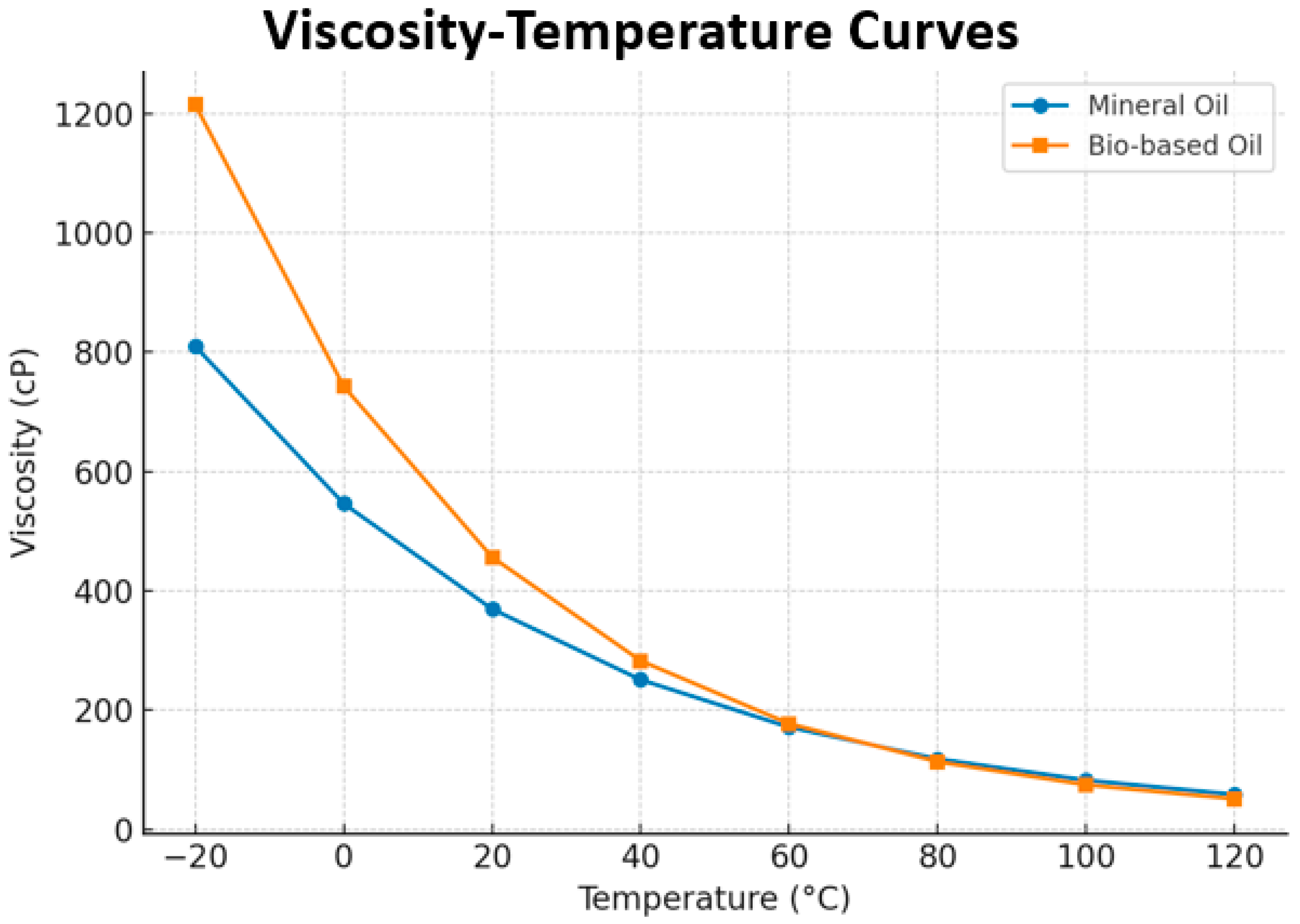
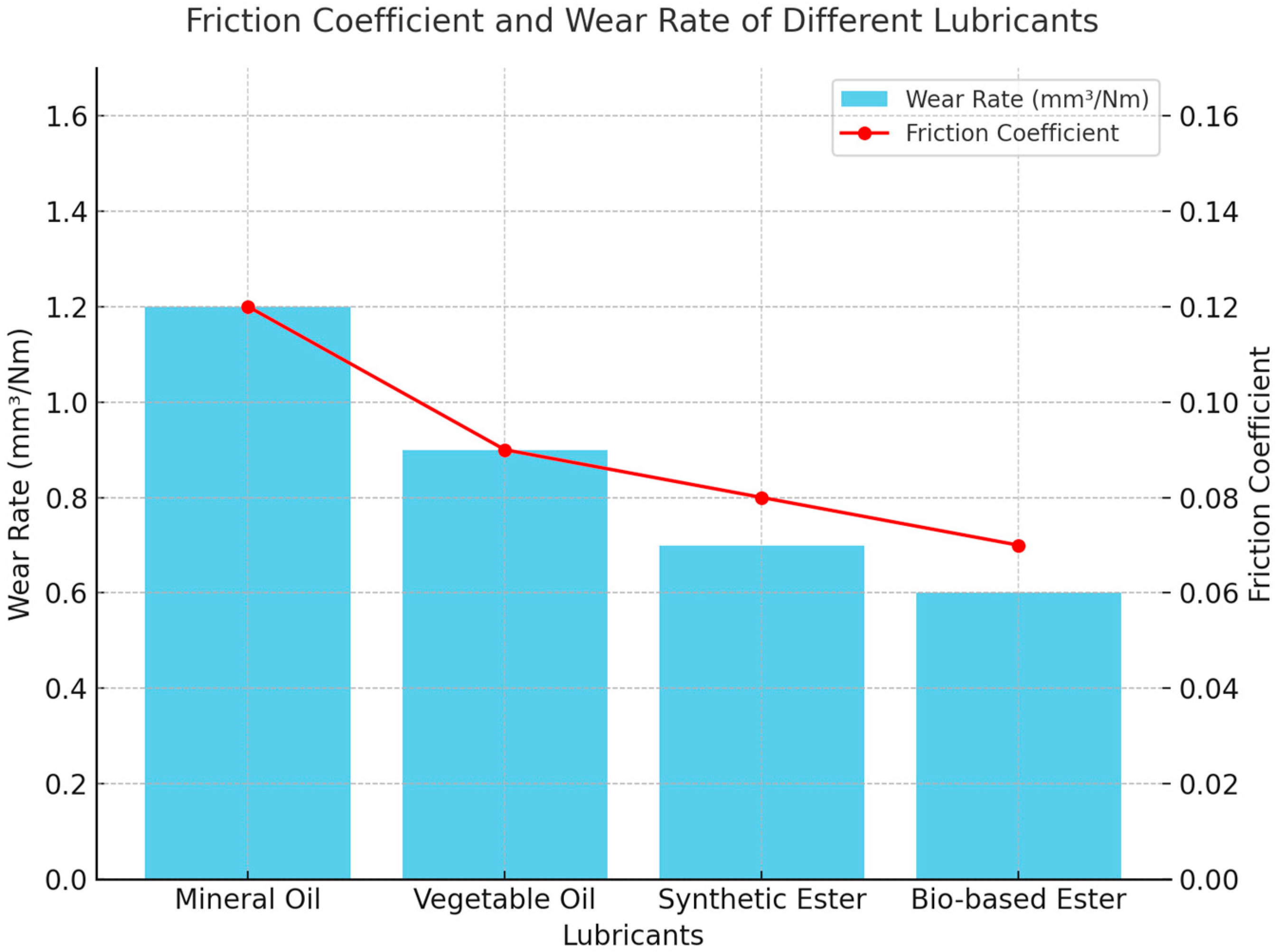



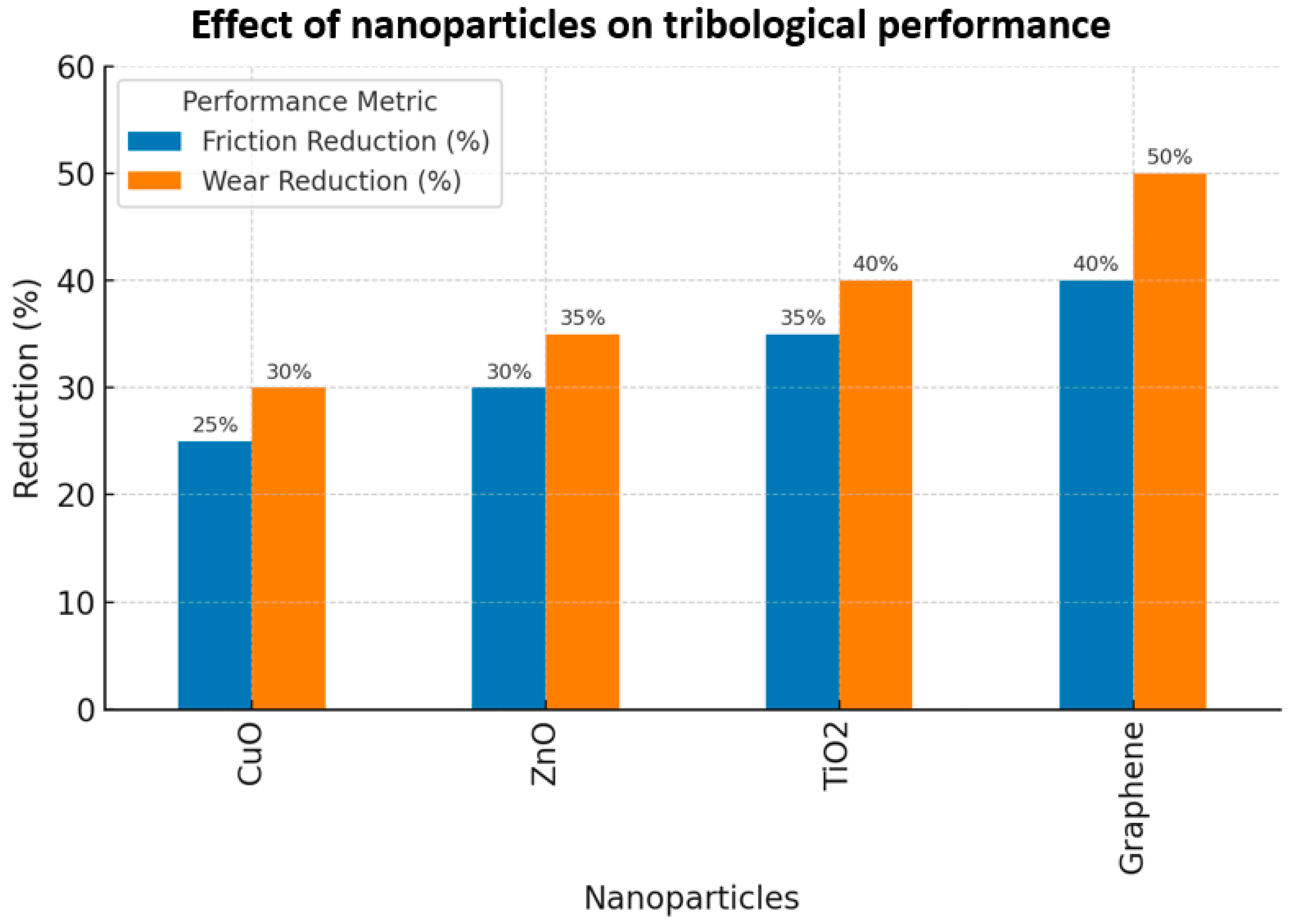

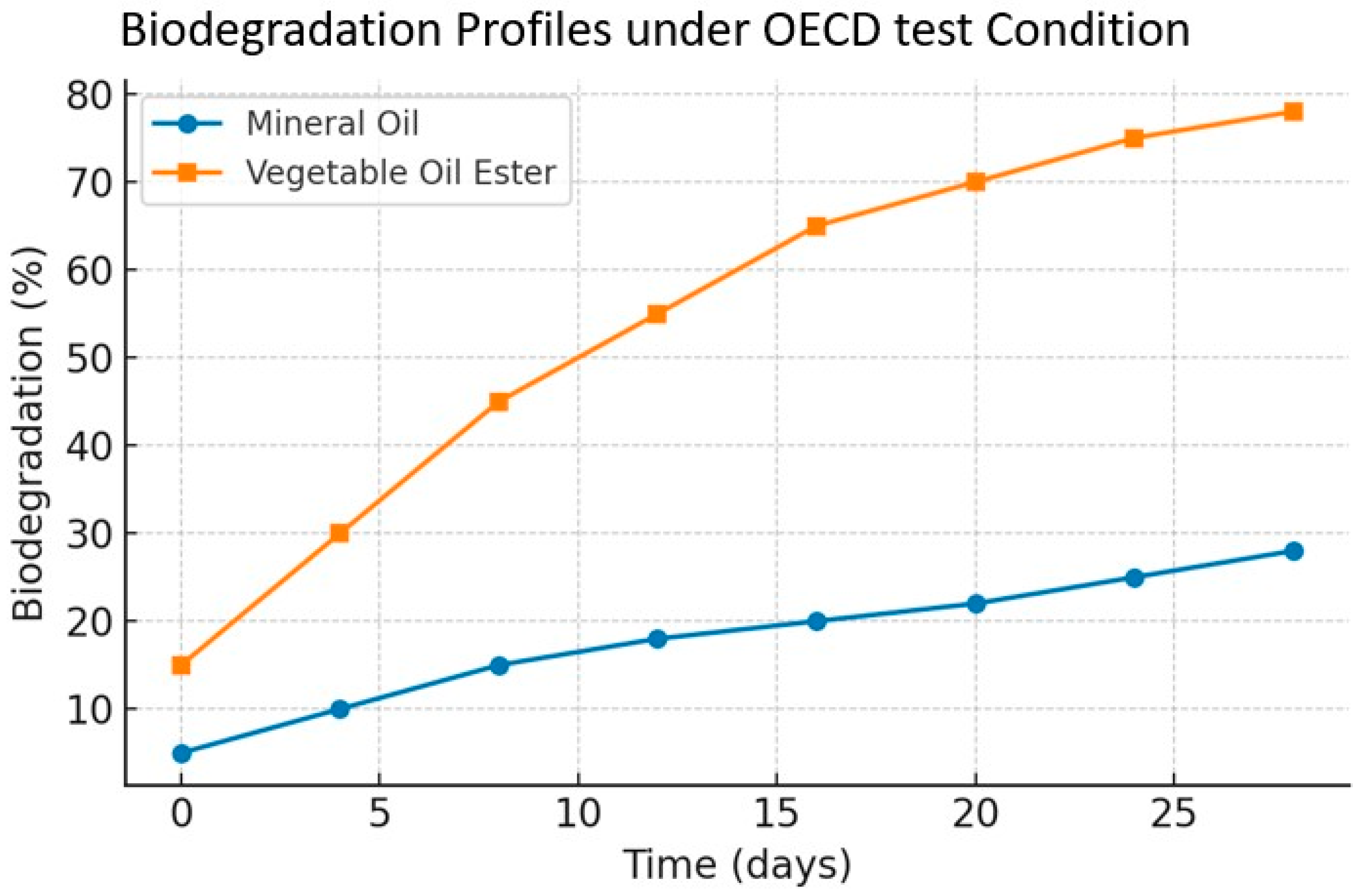
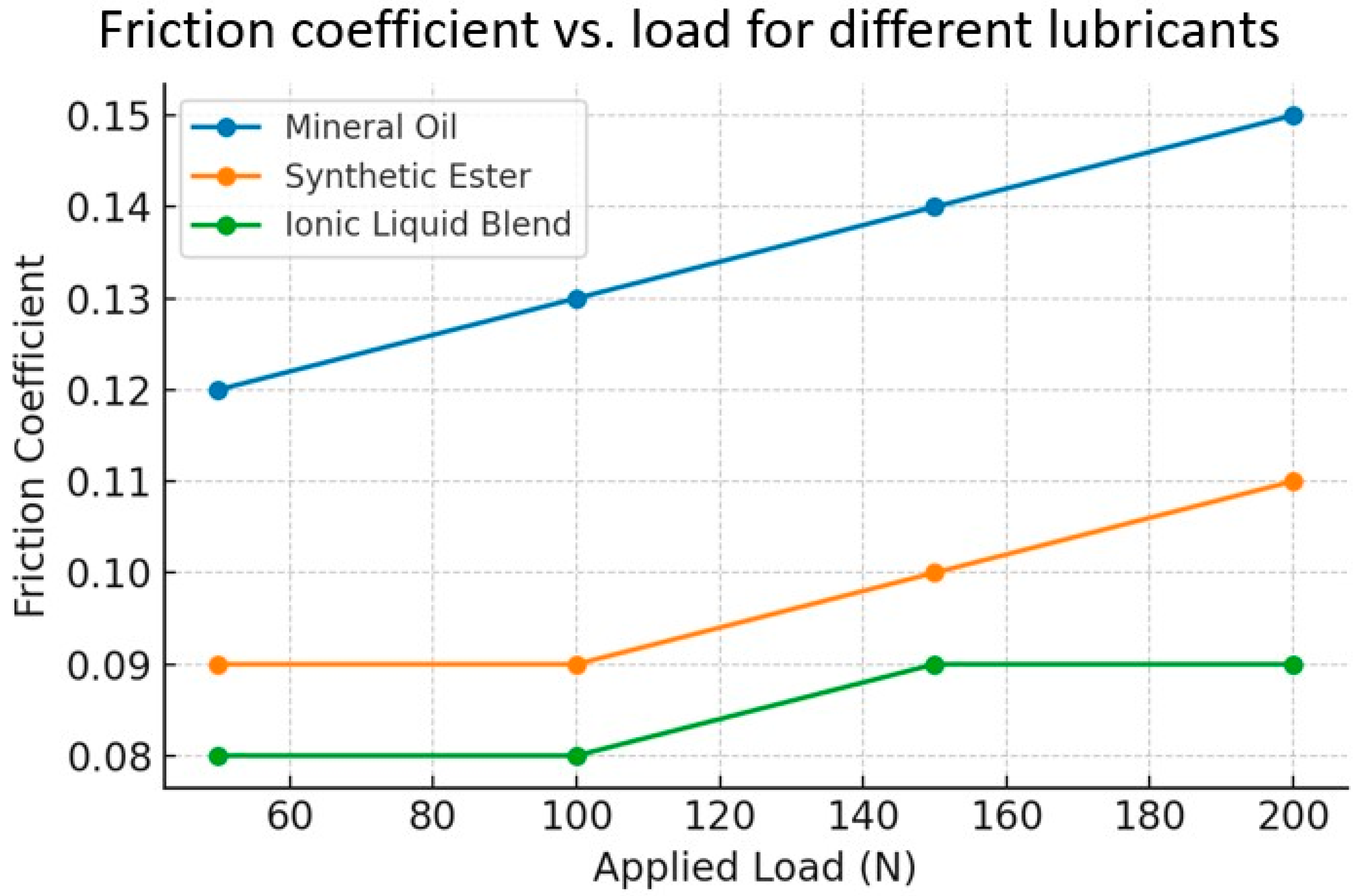
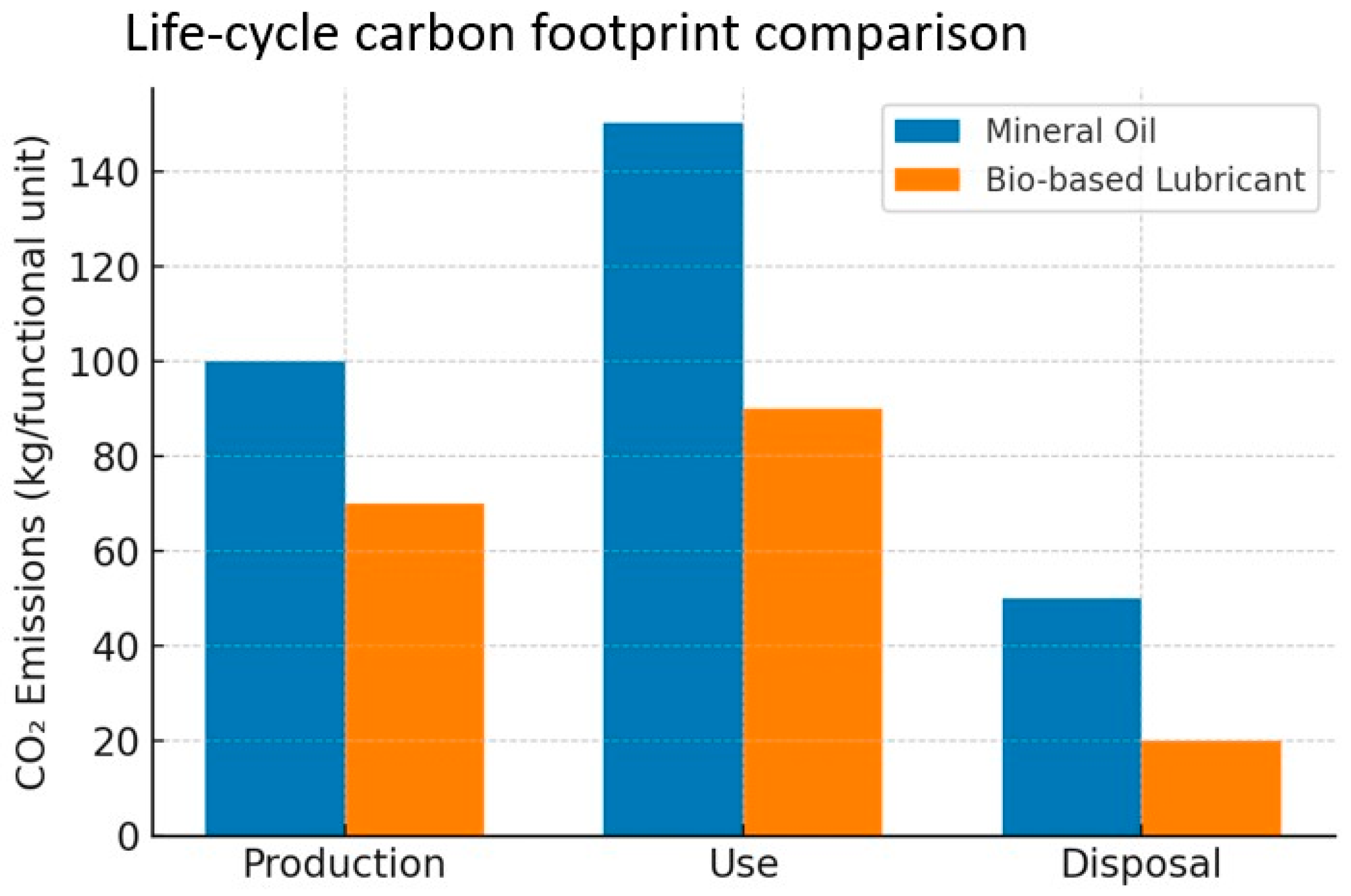
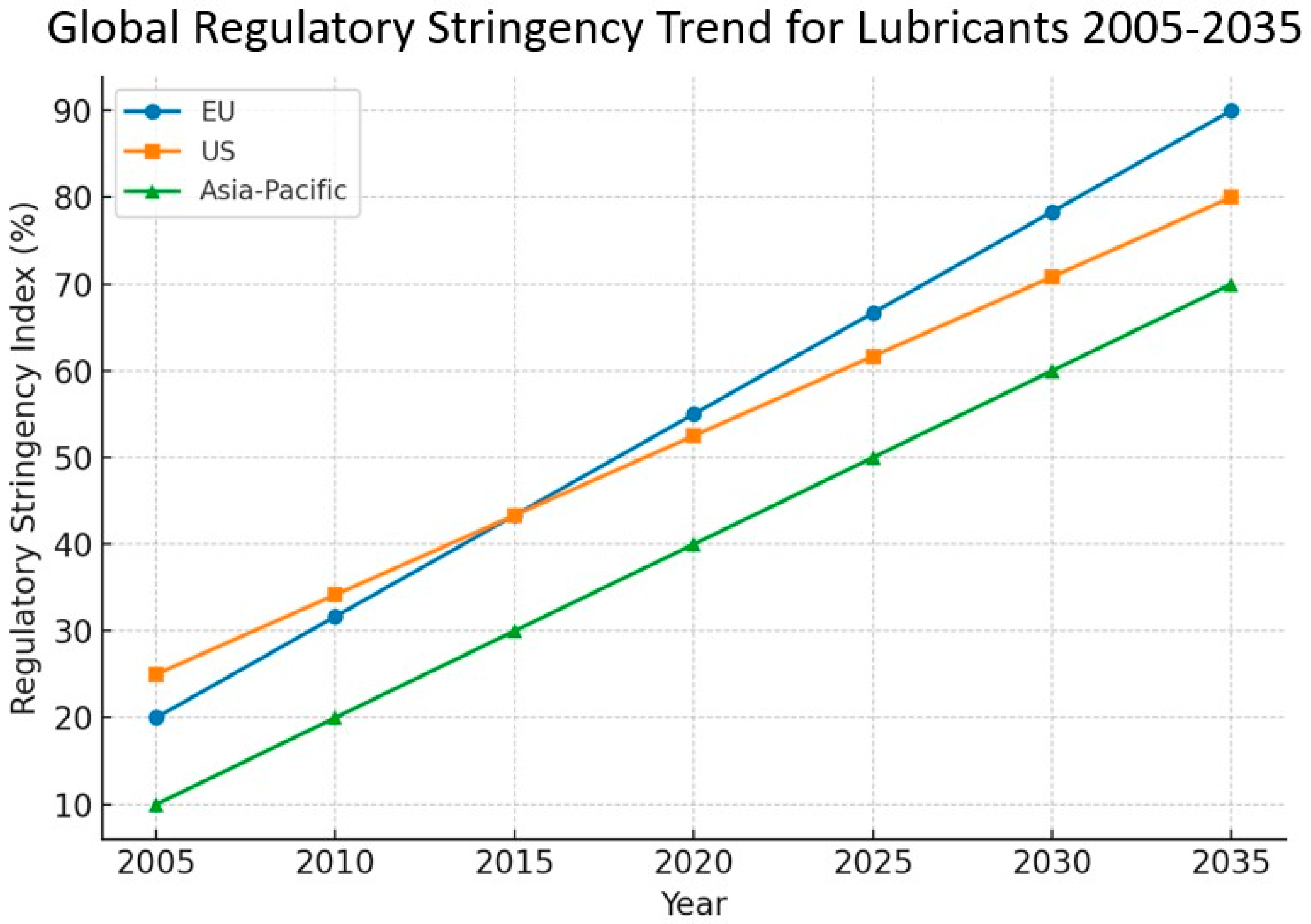
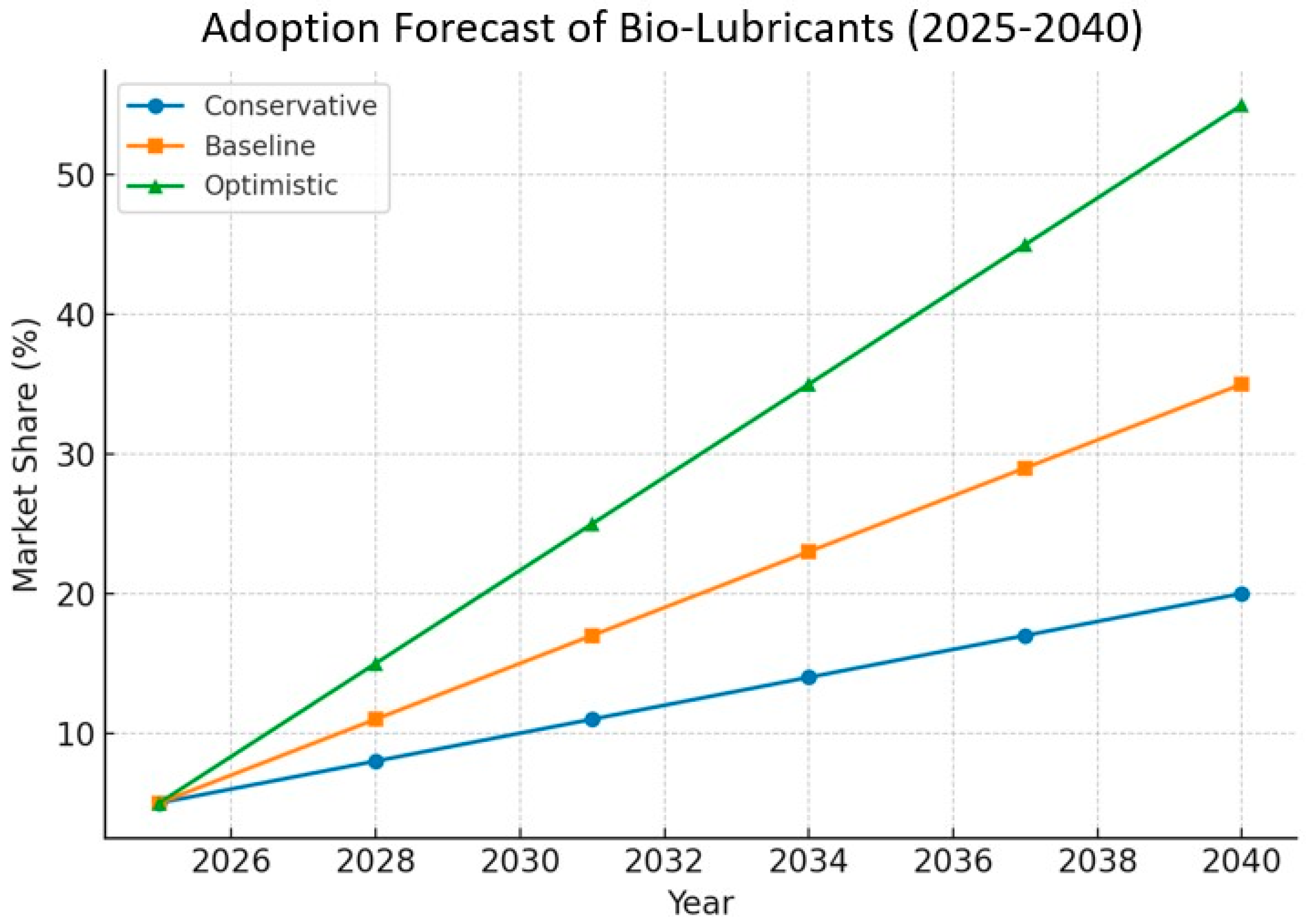
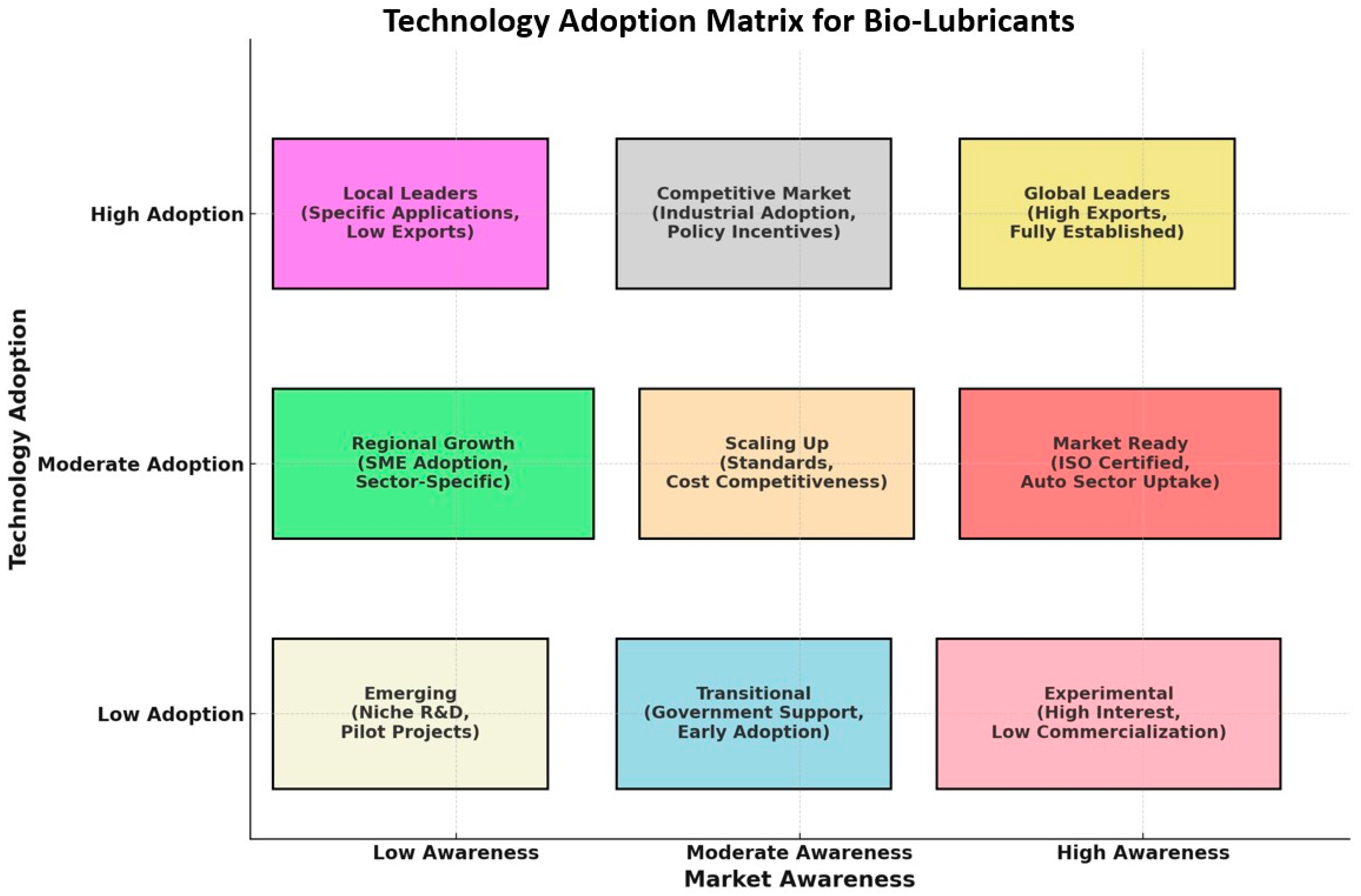
| Feedstock | Oleic Acid (C18:1, %) | Linoleic Acid (C18:2, %) | Saturated Fatty Acids (%, e.g., Palmitic + Stearic) |
|---|---|---|---|
| High-Oleic Sunflower Oil | 75–90 | 3–15 | 8–12 |
| Soybean Oil | 20–30 | 50–60 | 10–15 |
| Rapeseed Oil | 55–70 | 15–25 | 5–10 |
| Palm Oil | 38–48 | 10–12 | 45–50 |
| Castor Oil | 85–90 | 3–5 | 1–3 |
| Lubricant (Representative) | CoF (−) | Wear Scar (mm) | Source |
|---|---|---|---|
| Mineral oil base stock | 0.10–0.12 | 0.65–0.75 | [5,43] |
| Soybean oil (unmodified) | 0.09–0.11 | 0.58–0.65 | [5,43] |
| Epoxidized soybean/veg. oil | 0.08–0.10 | 0.48–0.55 | [22] |
| Rapeseed oil (chemically modified) | 0.09–0.10 | 0.49–0.55 | [10] |
| Parameter | Unmodified Oil | Transesterified Ester | Synthetic Ester |
|---|---|---|---|
| Viscosity Index (VI) | 180–190 | 200–210 | 220–240 |
| Pour Point (°C) | −3 to −6 | −9 to −12 | −15 to −18 |
| Oxidative Stability (h) | 20–30 | 40–50 | 60–70 |
| Modification | Target Property Improved | Industrial Application | Status (Lab/Industrial) |
|---|---|---|---|
| Transesterification | Cold-flow, biodegradability | Hydraulic fluids | Industrial |
| Epoxidation | Oxidative stability, polarity | Gear oils | Industrial/Research |
| Hydrogenation | Thermal/oxidative resistance | Turbine oils | Industrial |
| Estolide formation | Anti-wear, film strength, cold-flow | Engine oils (potential) | Research/Emerging |
| Base Oil | Additive (wt%) | Pour Point (°C) Before | Pour Point (°C) After | % Improvement |
|---|---|---|---|---|
| Soybean Oil | 1% PMA | –12 | –27 | 55% |
| Canola Oil | 1% Alkyl Naph. | –9 | –23 | 61% |
| Additive Type | Primary Benefit | Typical Performance Enhancement | Limitations | Recent Findings |
|---|---|---|---|---|
| Antioxidants | Thermal & oxidative stability | 2–3× extension of Oxidative Induction Time [7] | Limited long-term effect without regeneration | Synergy with natural phenolics [7] |
| PPDs | Low-temperature operability | Pour point reduction by 10–15 °C (e.g., 55–61% improvement) [5,19] | Compatibility issues, thermal stability | Effective in canola esters [5,19] |
| VI Improvers | Stable viscosity range | Maintain viscosity across broad temperature ranges [8] | Shear degradation | PMA copolymers most effective [8] |
| Nanoparticles | Reduced friction & wear | Up to 40% friction reduction; 30% Wear Scar Diameter decrease [10,40] | Agglomeration, cost, long-term stability | CuO, graphene, hBN best performers [10,37,40] |
| Ionic Liquids | Multifunctional benefits | Significant friction and wear reduction, improved oxidative resistance [38] | Cost, potential toxicity concerns | Choline-based ILs promising [38] |
| Hybrid Systems | Synergistic performance | Superior friction reduction and wear protection compared to single additives [40] | Complex formulation, optimization challenges | NP + IL blends outperform, enhanced EP properties [40] |
| Source | Base Year Value | Forecast Year | Forecast Value | CAGR (If Specified) |
|---|---|---|---|---|
| Plant-Based Oils for Sustainable Lubrication Solutions—Review [2] | 2.13 Billion USD | 2030 | 3.05 Billion USD | Not explicitly stated |
| Prospects of Plant-Based Trimethylolpropane Esters in the Biolubricant Formulation for Various Applications: A Review [8] | Implied from 2020 baseline | 2027 | 2.6 Billion USD | 5.2% (post-COVID-19) |
| Notes | Favored in Leakage-Prone Sites and Eco-sensitive Zones | Widespread Adoption for Stern Tubes Since VGP (2013) [59] | Drain Interval & Thermal Stability are Key Hurdles | Bio-Esters Help Lubricity; Microbial Control Can be Challenging | High Spec Hurdles; Niche/Fleet Demos Exist | Spill-Sensitive Soils Favor Bio-Lubricants | Regulatory Driver is Strong; Bio-Esters Common in H1 | Extended Drain and Cold-Start Demands are Critical | High Environmental Visibility Drives Use | Technology Readiness Still Low for Broad Use |
|---|---|---|---|---|---|---|---|---|---|---|
| Primary Drivers/Standards | ISO 15380 [60] (HEES/HEPR); EU Ecolabel; local spill regulations; OEM approvals | US EPA VGP; EU Ecolabel; ISO 15380; OEM marine approvals | OEM approvals; ISO 12925-1 [61]; sustainability targets | Occupational safety; VOC limits; wastewater discharge rules | OEM engine tests; CO2 targets; EELQMS/API/ACEA frameworks | OECD 301; eco-labeling; public procurement | NSF H1/H2; ISO 21469 [62]; HACCP/IFS/BRC | OEM approvals; LCA/ESG targets | Public procurement; local eco-tox rules | OEM/airworthiness tests; sustainability pilots |
| Adoption Status (2025) | High (EU/UK); Moderate–High (US); Emerging (APAC) | High (US VGP-driven); Moderate–High (EU) | Moderate (EU/US); Emerging (APAC) | Low–Moderate (global) | Emerging–Moderate (selected fleets); Low (passenger cars) | High (EU/Scandinavia); Moderate (US) | Very High (global) | Moderate (pilots & select fleets) | Moderate–High (EU); Moderate (US) | Low (R&D/pilots) |
| Key Performance Requirements | ISO 15380 compliance; VI ≥ 140; shear stability; anti-wear; water tolerance; corrosion protection | Biodegradability; low aquatic toxicity; seal compatibility; anti-wear/EP; hydrolytic stability | High EP/antiwear; micro-pitting resistance; oxidation stability; foam/air release | Lubricity; EP; stain control; microbial stability; mist/fume control; operator safety | Oxidation/piston cleanliness; LSPI control; volatility; seal compatibility | Biodegradability; anti-wear; water wash-off resistance; tack; low-temp pumpability | NSF H1 incidental contact; oxidation stability; water resistance; anti-wear | Oxidation life; micropitting; low temp flow; filterability; water tolerance | Adhesion; water wash-off; EP/anti-wear; corrosion protection | Thermal-oxidative stability; elastomer compatibility; low-temp viscosity |
| Typical Product Type | HEES (ester-based hydraulic oils), HEPR (synthetic esters/PAO blends) | Environmentally Acceptable Lubricants (EALs) based on saturated esters | Bio-synthetic ester gear oils; hybrid ester/PAO formulations | Vegetable-ester based neat oils; bio-based emulsion concentrates | Bio-ester/PAO blends; renewable synthetic esters (pilot) | Biodegradable chain oils; HEES/HEPR hydraulics | H1-registered bio-ester/white-oil/PAO blends | Bio-synthetic ester gear oils; HEPR hydraulics | Bio-greases (Ca/Li soaps with esters); HEES fluids | High-VI renewable esters; hybrid formulations |
| Industrial Sector | Hydraulic Systems | Marine (EALs) | Industrial Gear Oils | Metalworking Fluids (MWF) | Automotive Powertrain | Agriculture & Forestry | Food & Beverage (H1) | Wind Energy | Rail & Off-Highway | Aviation (R&D) |
| Test Standard | Principle | Test Duration | Pass Criteria | Typical Bio-Based Lubricant Result | Typical Mineral Oil Result |
|---|---|---|---|---|---|
| OECD 301B (CO2 Evolution Test) | Measures CO2 evolution during biodegradation | 28 days | ≥60% CO2 evolution (ThCO2) | High biodegradability (70–95%) | Low biodegradability (15–25%) |
| OECD 301F (Manometric Respirometry Test) | Monitors oxygen uptake in a closed system | 28 days | ≥60% O2 consumption (ThOD) | High biodegradability (65–90%) | Low biodegradability (10–20%) |
| Lubricant Type | Test Conditions | Average Friction Coefficient (µ) |
|---|---|---|
| Mineral Oil | Steel-on-steel, 40 °C, ASTM D4172 | 0.13 |
| Soybean oil | Steel-on-steel, 40 °C, ASTM D4172 | 0.11 |
| Challenge | Technology Response | Policy Lever |
|---|---|---|
| Poor oxidative stability | Enzyme-catalyzed esterification, advanced antioxidants | Incentives for biorefineries |
| High production cost | AI-driven process optimization, waste valorization | Carbon credits, subsidies |
| Cold-flow limitations | Hybrid nanoparticle additives, molecular design | Regional cold-weather standards |
| Lack of global test standards | ISO biodegradability protocols, standardized LCA | WTO harmonization policies |
Disclaimer/Publisher’s Note: The statements, opinions and data contained in all publications are solely those of the individual author(s) and contributor(s) and not of MDPI and/or the editor(s). MDPI and/or the editor(s) disclaim responsibility for any injury to people or property resulting from any ideas, methods, instructions or products referred to in the content. |
© 2025 by the authors. Licensee MDPI, Basel, Switzerland. This article is an open access article distributed under the terms and conditions of the Creative Commons Attribution (CC BY) license (https://creativecommons.org/licenses/by/4.0/).
Share and Cite
Patel, J.R.; Chauhan, K.V.; Rawal, S.; Patel, N.P.; Subhedar, D. Advances and Challenges in Bio-Based Lubricants for Sustainable Tribological Applications: A Comprehensive Review of Trends, Additives, and Performance Evaluation. Lubricants 2025, 13, 440. https://doi.org/10.3390/lubricants13100440
Patel JR, Chauhan KV, Rawal S, Patel NP, Subhedar D. Advances and Challenges in Bio-Based Lubricants for Sustainable Tribological Applications: A Comprehensive Review of Trends, Additives, and Performance Evaluation. Lubricants. 2025; 13(10):440. https://doi.org/10.3390/lubricants13100440
Chicago/Turabian StylePatel, Jay R., Kamlesh V. Chauhan, Sushant Rawal, Nicky P. Patel, and Dattatraya Subhedar. 2025. "Advances and Challenges in Bio-Based Lubricants for Sustainable Tribological Applications: A Comprehensive Review of Trends, Additives, and Performance Evaluation" Lubricants 13, no. 10: 440. https://doi.org/10.3390/lubricants13100440
APA StylePatel, J. R., Chauhan, K. V., Rawal, S., Patel, N. P., & Subhedar, D. (2025). Advances and Challenges in Bio-Based Lubricants for Sustainable Tribological Applications: A Comprehensive Review of Trends, Additives, and Performance Evaluation. Lubricants, 13(10), 440. https://doi.org/10.3390/lubricants13100440






